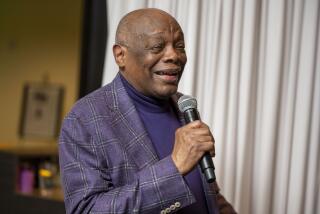Conroy Mocked ’94 Penalty, Jury Is Told
- Share via
SACRAMENTO — Former Assemblyman Mickey Conroy, on trial for alleged sexual harassment, should not have given his top aide a week’s pay after the Assembly docked the aide’s pay for that offense, former Speaker Willie Brown testified Monday.
Brown, now the mayor of San Francisco, said it was inappropriate for the Orange County Republican to use campaign funds to pay Pete Conaty after he was fined a week’s salary for violating the Assembly’s sexual harassment policy.
Conroy’s decision to circumvent the penalty, Brown told a nine-man, three-woman jury, “is a subversion of the rules and makes a mockery of the penalty imposed.”
Conaty has conceded that he needed the money because of financial responsibilities such as his home mortgage. He also said he performed numerous hours of work for Conroy’s campaign to earn the pay.
Brown, who was speaker when Conroy and Conaty were accused of sexual harassment by former staffer Robyn Boyd, also challenged defense arguments that Boyd, a $6-an-hour clerk, was dismissed for budgetary reasons.
While calling Conroy “a very good friend,” Brown said the former assemblyman could have gotten extra money had he really wanted to keep Boyd on staff.
“Mr. Conroy was a good-enough friend of the house,” Brown said. “I would have attempted to find some way to work it out.”
Brown also said he personally handed Conroy a letter of reprimand in a private meeting at the speaker’s office. During that meeting, Conroy didn’t deny his conduct or suggest that the fired staffer was lying, Brown said.
The Legislature’s former top Democrat also said Conroy was among the first lawmakers to be taken to task under the Assembly’s sexual harassment policy, which was crafted in the early 1990s.
“This was a painful thing for me,” Brown recalled. “Mickey is a good friend, and I didn’t want to hurt him.”
Boyd worked at Conroy’s Capitol office for nine months in 1993. After her dismissal, she filed a formal complaint with the Assembly Rules Committee. The committee hired two attorneys to study the case, and they found in March 1994 that Conroy and Conaty had violated the Assembly’s sexual harassment policy, leading to the punishment of both by the house.
Conroy left office in November because of term limits. He was trounced in a bid for an Orange County Board of Supervisors seat after his opponent repeatedly brought up the harassment case.
Boyd, 38, says Conroy subjected her to hugs, kisses, inappropriate touching and sexual jokes, then fired her after she complained.
On the second day of the civil trial, Boyd testified Monday that when she confronted Conroy about his behavior, he had said that “if he wanted to fool around, he wouldn’t go for an old bag mother of three like me,” Boyd said.
After that, she said, the touching, hugs, kisses and back rubs stopped, but the sexual jokes and innuendo continued.
She also began to get “nit-picked” by Conaty, Boyd said, and felt isolated by others in the office.
“I was gradually feeling there was more tension in the office, feeling more and more cold shoulder,” Boyd said. “I was excluded from meetings I had previously attended. I was feeling I was not part of the office team.”
In November 1993, Conaty told her she was being fired.
“I felt blindsided, and I didn’t know what to say,” Boyd recalled. “He said something like, ‘Say something.’ I said, ‘This sucks.’
“He said, ‘It’s not that you don’t do good work.’ He said, ‘You do good work.’ He said he’d give me a recommendation,” she said.
Dennis Murphy, Conroy’s lawyer, said Boyd was fired not because of her sexual harassment complaint but because of budget cuts and poor performance. Many of the most overt physical gestures never occurred or were misconstrued, Murphy contends.
The defense lawyer said Boyd also was let go because she would not work full time. Boyd denied she was ever offered full-time work.
Murphy pressed Boyd on the consistency of her recollections. He pointed out that Boyd asserted in the lawsuit that Conroy had touched her breasts. But a diary she kept during her tenure with the lawmaker described it as “nearly” touching.
“In your notes you never mentioned he touched your breasts, did you?” Murphy questioned.
“You can describe it any way you want,” Boyd said. “I used those words to describe the same thing. . . . It’s not an easy thing to admit to or to write.”
More to Read
Get the L.A. Times Politics newsletter
Deeply reported insights into legislation, politics and policy from Sacramento, Washington and beyond. In your inbox twice per week.
You may occasionally receive promotional content from the Los Angeles Times.










